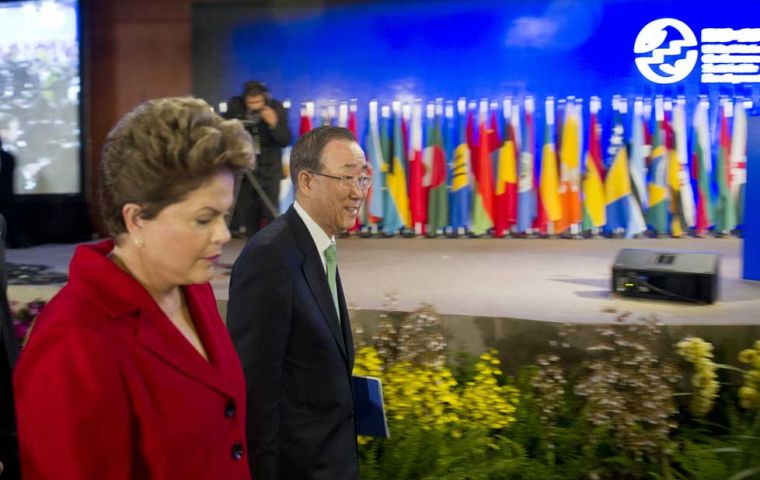MercoPress. South Atlantic News Agency
Ban Ki-moon at Rio+20: “the old model for economic and social development is broken”
 The UN Secretary General at the opening ceremony next to Brazilian president Dilma Rousseff
The UN Secretary General at the opening ceremony next to Brazilian president Dilma Rousseff More than 100 Heads of State and government gathered on Wednesday in Rio de Janeiro for the start of the United Nations Conference on Sustainable Development (Rio+20), which seeks to shape new policies to promote global prosperity, reduce poverty and advance social equity and environmental protection.
“We are now in sight of a historic agreement,” Secretary General Ban Ki-moon said in his address to Rio+20’s opening session. “Let us not waste this opportunity. The world is watching to see if words will translate into action, as we know they must.”
After intensive and protracted informal negotiations on how to accelerate the implementation of sustainable development, 191 countries reached agreement Tuesday on the Conference’s outcome document. The text will now be put forward for adoption by Heads of State at the conclusion of Rio+20 on Friday.
“I am pleased that negotiations have reached a successful conclusion and I commend the Presidency of Brazil for facilitating this resolution,” Mr. Ban said.
More than 40.000 people – including parliamentarians, mayors, UN officials, chief executive officers and civil society leaders – are attending Rio+20 from 20-22 June. The event follows on from the Earth Summit in 1992, also held in Rio de Janeiro, during which countries adopted Agenda 21 – a blueprint to rethink economic growth, advance social equity and ensure environmental protection.
“We have been given a second chance,” Mr. Ban said, adding that since the Earth Summit twenty years ago progress has been too slow, and much more needs to be done. “Rio+20 is not an end but a beginning. It is time for all of us to think globally and locally.”
Rio+20’s outcome document, entitled “The Future We Want,” calls for a wide range of actions.
These include: beginning the process to establish sustainable development goals; detailing how the green economy can be used as a tool to achieve sustainable development; strengthening the UN Environment Programme; promoting corporate sustainability reporting measures; taking steps to go beyond GDP to assess the well-being of a country; developing a strategy for sustainable development financing; and, adopting a framework for tackling sustainable consumption and production.
It also focuses on improving gender equity; recognizing the importance of voluntary commitments on sustainable development; and stressing the need to engage civil society and incorporate science into policy; among other points.
“We think the text contains a lot of action, and if this action is implemented, and if follow-up measures are taken, it will indeed make a tremendous difference in generating positive global change,” Rio+20’s Secretary-General, Sha Zukang, said after the conclusion of the outcome document negotiations on Tuesday.
In addition to the outcome document, there have been nearly 500 voluntary commitments on sustainable development activities by civil society groups, businesses, governments and universities. The UN’s Global Compact initiative, which concluded its Corporate Sustainability Forum yesterday, announced more than 200 commitments to sustainable development by businesses.
Speaking at Rio+20’s ceremonial opening, on Wednesday afternoon Secretary-General Ban thanked Brazil for hosting the Conference, and expanded on the opportunity it presented to the world.
“We recognize that the old model for economic development and social advancement is broken,” he said. “Rio+20 has given us a unique chance to set it right, to create a new model, to set a new course that truly balances the imperatives of robust growth and economic development with the social and environmental dimensions of sustainable prosperity and human well-being.”
“But, we need to keep our eyes on the prize. We need to act with vision and commitment, commitment and vision in the largest sense,” the UN chief added. “Let us not forget the scarcest resource of all: Time. We are running out of time. We no longer have the luxury to defer difficult decisions. We have a common responsibility to act in common cause; to set aside narrow national interests in the name of the global public good and the betterment of all.”




Top Comments
Disclaimer & comment rules-

-

-

Read all commentsThis is taking place in Brazil, a country that is raping its own natural resources to keep their economic “miracle” happening. Hypocritical in the extreme.
Jun 21st, 2012 - 07:15 am 0The Rain Forests in Brazil have survived much better than those in Africa and Indonesia. We all benefit from the lungs of the World, seems a little unfair for Brazil to carry the entire responsibility on its shoulders.
Jun 21st, 2012 - 08:19 am 0More than 100 Heads of State and government gathered on Wednesday in Rio de Janeiro for the
Jun 21st, 2012 - 01:39 pm 0Summer festivities and party season,
Barbecues on the beach, saunas and volley ball,
All having a very nice time, at the worlds expense.
Oh by the way we will all be back soon, with a silly made up agreement, that no one will act upon,
Still that gives us all another reason to come back to the beach next moth.
Wish you were all here,
But sadly its only for us, so soddy offy
.
Commenting for this story is now closed.
If you have a Facebook account, become a fan and comment on our Facebook Page!